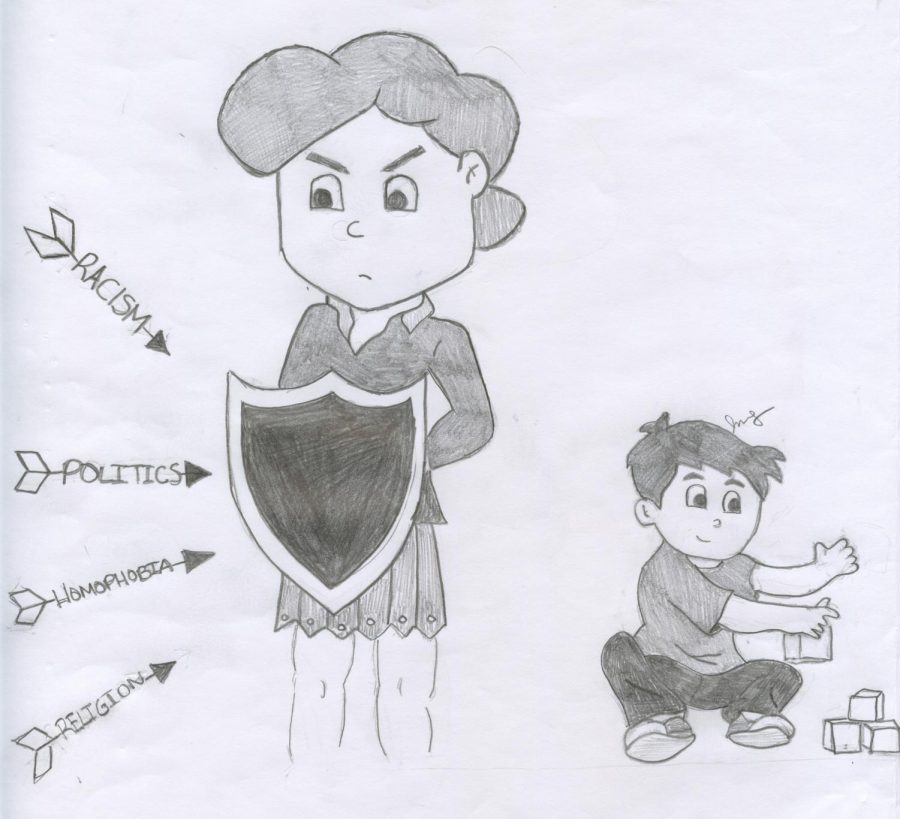No more room at the kids’ table
Familial bias too often shapes, oppresses youth ideals
As Thanksgiving rolls around every year, relatives from far away often come together for a feast. A separate table is set for the children to sit at, separate from the adults. As the night rolls on, arguments break at the adult table; whether it’s about a recent divorce or politics, loaded words get exchanged. Opinions fill the room, and that includes the ears of the children. What are the children expected to take away from this?
When children are growing up, parents are one of the biggest influencers on their children’s lives. Parents share their wisdom, ignorance and everything in between with their children, originating from expressing their own opinions and what they expose to their children. Parents find themselves solely responsible for their offspring’s upbringing, but does that mean they should also be solely responsible for their child’s opinions? No. Parents should be held accountable for exposing their children to a variety of opinions and experiences so their children can become individuals in thoughts and actions.
The events that people face across the world shape everyone into individuals. Whether people realize it or not, these events and situations shape thoughts, words and actions. These events are really what put opinions to the test. Would someone who is pro-life and faces an accidental pregnancy be willing to get an abortion? Would a child still love their parents if they got kicked out of the house? Would a high schooler still be willing to drink after alcohol poisoning claims a friend’s life? Previously held beliefs can become compromised when a life-altering event suddenly enters daily routine. Without events like this happening, how is one supposed to know what they should believe in? The answer is experience is necessary to shape an individual’s thoughts and actions; shielding and ignorance damages children’s ability to think for themselves.
Without encouragement to seek or share differing ideas, parents unknowingly create an ideological barrier between their children and themselves. When a parent expresses one set of opinions and nothing else and their children align themselves with different ideals, difficulties can arise. When differing opinions are met with hostility, children begin to hide other ideas their parents might deem “wrong.” Arguments seen at family gatherings can further advance this idea that differences bring discord. By not encouraging open conversation of personal thought, parents limit the relation they have with their child.
Topics like religion and politics are ignored in normal dinner table discussions. By having an uncharged discussion about these topics, parents can assist in the formation of these opinions in their child. Instead they are ignored and discourse tends to follow if these “forbidden” topics are brought up.
But in the end, how does an individual know if the thoughts and ideals they posses really hold true? The answer to that question lies in argument, practice and censoring. When engaged in an argument, true beliefs will always be argued no matter what a person believes. If they find their case faltering, then there is a possibility they don’t truly hold that opinion or they don’t have enough knowledge on the topic. The underlying problem with argument, though, is that when two people truly believe two different things, they will be unyielding to the other, resulting in wasted words.
Practice allows people to see the outcome of their beliefs. Outcomes help people determine if they are willing to support their beliefs. Censorship brings people to action based on someone quieting them and the censored group refusing to be silenced. When holding personal beliefs, one should be willing to defend their ideals even when oppressed.
Though parents and events shape daily lives, it’s still important for people to self-educate on topics. Parents allow for certain ideas and topics to be presented but still contain bias. Experiences aren’t always guaranteed to occur. Open education of topics is the best way for youth to learn and develop into individuals that will one day occupy the same role as their parents did while encourages the development of their children.



